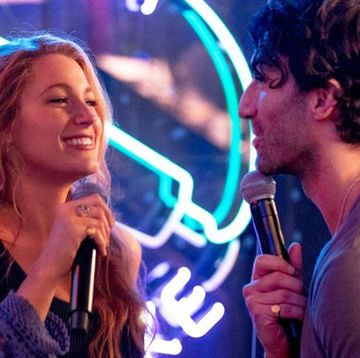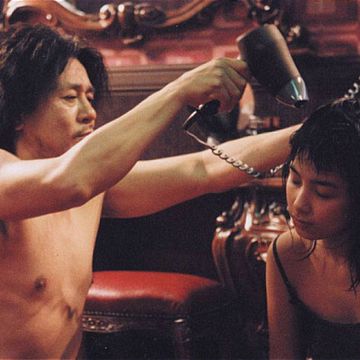A biopic about Amy Winehouse's life and career is due for release in April 2024, titled Back to Black. And while some fans are no doubt excited to see her legacy play out on screen, others have criticised the film for a plethora of reasons, spanning from the commodification of female pain, to questioning the intentions behind the project.
*Trigger warning: contains mentions of eating disorders and substance abuse*
In case you need a refresher, Amy was a singer and songwriter from Camden, who was renowned for her candid and open personality and incredible soulful voice, winning six Grammys including Record and Song of The Year. But the singer also suffered with both eating disorders and alcohol and drug abuse, eventually dying of alcohol poisoning on 23rd July 2011, at the age of 27.
Here's everything you need to know about the controversy surrounding the Amy Winehouse biopic, Back to Black.
First things first, what is Back to Black?
The biopic was first announced in October 2018, when it was revealed that Amy Winehouse's estate had signed a deal to make a film about her life and career. Then, in 2022, it was confirmed that StudioCanal were on board, with Sam Taylor-Johnson (of Fifty Shades fame) on to direct.
The official synopsis says the film will cover "Amy’s extraordinary genius, creativity and honesty that infused everything she did. A journey that took her from the craziness and colour of '90s Camden High Street to global adoration, and back again, Back to Black crashes through the looking glass of celebrity to watch this journey from behind the mirror, to see what Amy saw, to feel what she felt."
The cast is made up of Marisa Abela as Amy, Jack O'Connoll as her husband Blake Fielder-Civil, Eddie Marsan as father Mitch Winehouse and Lesley Manville as Cynthia Winehouse.
Why are people critical of the Amy Winehouse biopic?
Some claim it's too soon after Amy's tragic death
Much of the early criticism of the biopic stemmed from the fact many fans thought it was too soon after Amy's passing, deeming it insensitive to sensationalise Amy's rise to fame and the more tragic elements of her story, when so many of us remember it in recent history.
Winehouse rose to fame in the early 2000s, and one argument suggests it's unnecessary to go over her pain and demise already, barely a decade later, particularly when it was so heavily documented the first time around.
"Too soon to make an Amy movie. She’s still fresh in my brain and I loved her and her music," one person summarised in the comments for the latest trailer, while another tweeted, "We don’t need a biopic of Amy Winehouse yet, because we all lived through her career highs and lows. Stop profiting from her!"
Others argue the biopic commodifies female pain
While it's hard to know for sure until seeing the film in full, many are questioning whether filmmakers should be profiting from the tragedy surrounding Amy's story. Recently, films like Blonde, the Marilyn Monroe biopic, have received criticism for their portrayal of female pain, and whether such scenes are necessary to play out on screen.
Early photos from the Back to Black set show Marisa Abela (who is playing Amy) breaking down in distress, with the singer's iconic beehive dishevelled and her makeup smudged. Ohers show her having what seems to be a breakdown following husband Blake's arrest - when in reality, in pap photos from the time, she seems calm and demure.
Much of Amy's story is filled with devastation, with the singer's addiction problems playing out on a public platform (quite literally - she was often booed offstage for being intoxicated during performances) and through the eyes of the media. Is there any need for this female suffering to be commemorated on screen, when we could let her legacy be in her music?
Also, Amy's long-standing battle with the media and paparazzi is well documented, and the invasion into the singer's privacy often meant everything from her relationships to her substance abuse was splashed across the front pages. So much so, that she won an injunction against the paparazzi agency, Big Pictures, under the Protection from Harassment Act 1997, in 2009. Would a dramatisation of her life really be what she wanted?
The involvement of the Amy Winehouse foundation
Another cause for concern among Amy Winehouse fans is the fact her foundation - and more specifically, her father Mitch Winehouse - is involved in the making of Back of Black, and may try to rewrite history to portray themselves in a more favourable light.
Amy's dad - a singer himself but also a taxi driver - was criticised throughout her career for seemingly enabling her downfall, and not always having her best interests at heart. In one particular scene in the 2015 documentary Amy, it appears Mitch doesn't want to send his daughter to rehab (hence the famous line 'And my daddy thinks I'm fine'), while in others, he seems more interested in pursuing his own level of fame.
In response, Mitch told The Guardian at the time that the film "is both misleading and contains some basic untruths. They are trying to portray me in the worst possible light."
The film won the Academy Award for the best documentary in 2016, with the filmmakers saying they spoke to over 100 people from Amy's life, adding that "the film tells is a reflection of our findings from these interviews."
What have the filmmakers said in response to the criticism?
Responding to concerns about Back to Black, director Taylor-Johnson, said: "I feel excited and humbled to have this opportunity to realise Amy’s beautifully unique and tragic story to cinema accompanied by the most important part of her legacy — her music. I am fully aware of the responsibility, with my writing collaborator — Matt Greenhalgh — I will create a movie that we will all love and cherish forever. Just like we do Amy."
Back to Black is in cinemas on 12 April 2024.

Dusty Baxter-Wright is an award-winning journalist and the Entertainment and Lifestyle Director at Cosmopolitan, having previously worked at Sugarscape. She was named one of PPA’s 30 Under 30 for her work covering pop culture, careers, interiors and travel, and oversees the site’s Entertainment and Lifestyle strategy across print, digital and video. As a journalist for the best part of a decade, she has interviewed everyone from Louis Theroux and Channing Tatum to Margot Robbie and Ncuti Gatwa, while she has also spoken on Times Radio and BBC Radio. You can find her on Twitter and Instagram here.














